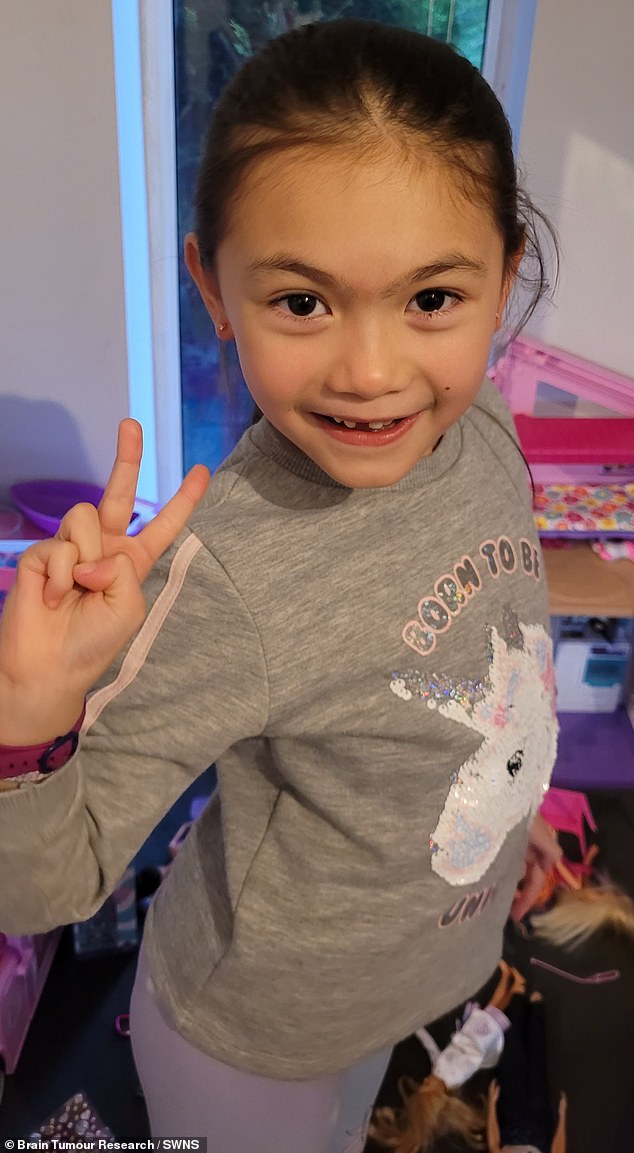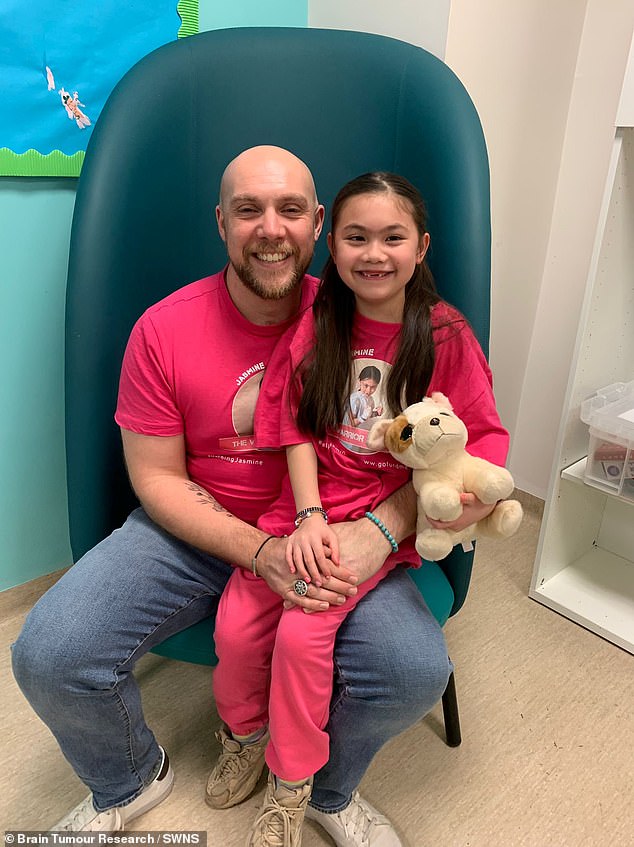Desperate families raise millions of pounds each year to send their terminally ill children abroad to receive “unproven” brain cancer treatments that “don’t work”, experts warn.
Foreign clinics offer clinical trial sites for experimental drugs to young patients, but make them pay for all aspects of care.
NHS doctors have told everyone that nothing more can be done to stop the disease, so they feel they have no choice.
Medical centers – often in Mexico, Germany and the United States – charge a high price, with families contributing up to £1 million. Most raise money through crowdfunding websites like GoFundMe and JustGiving.
However, leading brain tumor experts say many of these clinics offer “unorthodox” medications and surgical procedures and sometimes “take advantage” of families seeking a glimmer of hope.
Anthony Freeman’s family raised £246,000 to treat his daughter Jasmine in the Netherlands
In some cases, these treatments have a high rate of side effects, forcing some children to be hospitalized, they say. And in many cases these therapies do not prolong life.
Some childhood brain tumor doctors told The Mail on Sunday they know families who sought help at clinics offering low-carbohydrate diets and ineffective cannabis oil treatments.
According to GoFundMe, around £500,000 is raised each year to fund private treatment and associated costs for children with a rare form of brain tumour, diffuse intrinsic pontine glioma (DIPG).
Our findings come after the government announced last week that it would spend £40 million on brain tumor research in an effort to improve poor outcomes from the disease.
Brain Tumor Research is calling on the Government to use the money to fund more clinical trials for children with the disease, so that parents are not forced to raise these large sums or find themselves in extreme financial difficulties.
‘We know of at least five families who raised money to travel abroad last year. The numbers embracing these last-chance options embarrass the UK,” says Dr Karen Noble, Research Director at Brain Tumor Research.
‘Of course, parents will travel to the four corners of the Earth to find hope, but this hope must be based on scientific and clinical evidence. Our position is not one of criticism of the families, but rather one of complete understanding and indignation that this situation has been reached while the UK is moving down the list of countries where clinical trials are being instigated.’
“Unfortunately, most overseas treatments do not prolong children’s lives any more than standard NHS treatment,” says Dr Fernando Carceller, consultant pediatric neuro-oncologist at The Royal Marsden NHS Foundation Trust.
“And there are cases where children experience uncomfortable side effects while taking these medications.”
Every year around 16,000 people in the UK are diagnosed with a brain tumour. About 400 of them occur in children.
Less than a fifth of patients survive more than five years after diagnosis.
Brain tumors are also the leading cause of cancer death among children.
Clinical trials, which allow patients to access new and experimental treatments before they are approved, may offer some hope.
However, there has been a 40 per cent reduction in new trials since 2017, due to lack of funding and the impact of the Covid pandemic. News about experimental therapies often spreads through Facebook groups dedicated to brain tumor families.
Before the pandemic, experts say there was a surge in demand for an unproven procedure in Mexico that involved injecting chemotherapy drugs directly into the arteries that carry blood to the brain.
This was based on the theory that many cancer drugs are ineffective because they cannot cross the blood-brain barrier, a membrane filter that prevents unwanted substances from reaching the brain.
In one case, the British family of nine-year-old Lucy Moroney raised £300,000 in 2017 to send her to Mexico for the procedure.
However, less than a year after starting treatment, Lucy died. There is still no high-quality evidence that the procedure has benefited patients.
Experts say that since then, there have been other new treatment trends that have led parents to travel abroad.
“I’ve had parents ask me about ketogenic (low-carb) diet and CBD (cannabis) oil clinics for their children,” says Dr. Carceller.
‘These trends come and go, but families cling to anything. They don’t want their children to miss out on an experimental treatment that could save them.’
He added: ‘Most doctors at these clinics would not accept children who are too sick to benefit. But there are doctors who take advantage of the desperate situation in which these families find themselves.”
Unlike traveling abroad, taking part in clinical trials in the UK costs nothing.
In 2022, eight-year-old Rudi Abbot from Edinburgh was told by the NHS that his brain cancer could not be cured, and he was sent to Seattle, US, for an experimental trial of a drug that boosts the immune system. after his parents raised £110,000.
Rudi continued taking the medication for only four months before doctors concluded that it had no effect. He died less than a year later.
While experts sympathize with parents doing everything they can to save their children, some question whether these crowdfunding efforts are being put to good use.
“We’re talking about huge amounts of money,” says Dr. Carceller. «In some cases, it would be enough to open a new trial in the United Kingdom.
There is also the risk that the patient could suffer a serious illness while abroad, which would put the family in even greater financial difficulty.
In 2022, 13-year-old George Fox, from Bedfordshire, traveled to Los Angeles after his parents raised £300,000 on GoFundMe to put him through unapproved cancer therapy.
However, during the trip his condition worsened and he was taken to the emergency room. He never started treatment. The family was left with a £500,000 medical bill, paid for by raising a further £200,000 through crowdfunding. He died months later.
“Families are cut off from their support network and don’t have the NHS if a child deteriorates abroad,” says Professor Darren Hargrave, a pediatric neuro-oncologist at Great Ormond Street in London. “They may face massive, unexpected additional costs and stress.”
However, there are some children who do benefit from traveling abroad for treatment.
In 2014, the parents of Ashya King, a five-year-old boy with a brain tumour, removed him from NHS care and traveled abroad instead.
Ashya had successfully undergone surgery to remove the tumour, but the hospital planned to treat it with radiotherapy to ensure the cancer did not return.
Naghmeh and Brett King wanted their son to receive proton beam therapy, a treatment similar to radiotherapy that is believed to have fewer side effects, but which was not offered on the NHS at the time.
Ashya was taken from Southampton General Hospital and the family traveled to France. This unleashed an international persecution that ended with the arrest of the parents in Spain.
But the High Court ultimately ruled that Ashya could receive proton therapy in the Czech Republic. A decade later, he is still alive and the NHS now offers proton therapy to some brain cancer patients.
Experts say these cases are rare and the harsh truth is that, in many cases, nothing can be done for patients, especially those with DIPG tumors.
“When I see children with these tumors, I want to make sure they are cared for,” says Professor Hargrave. ‘We want to make sure they don’t suffer and that the family is supported.
“We could talk about experimental trials as an option, but we would be honest about the chances of test therapies working.”
However, experts agree that it is essential that the Government makes more funding available for brain cancer clinical trials in the UK.
“Trials are not a panacea, but they are the best solution we have,” says Dr. Carceller.
“The more patients we can include in trials in the UK, the better the chances of finding new cures.”
THE £250,000 TRIAL DRUG WAS IN VAIN
The first sign that seven-year-old Jasmine Freeman was not perfectly healthy was when she began experiencing double vision in February 2023.
Her optician in Bracknell, Berkshire, couldn’t find anything wrong with her eyes, so several weeks later Jasmine was sent to hospital for a brain MRI.

Jasmine Freeman developed an incurable midline glioma and died in January, less than a year after her diagnosis.
Her father Anthony, 37, says he received the news that night: Jasmine had a brain tumor.
The next day, a neurosurgeon explained to Anthony and Jakki, Jasmine’s mother, that she had an incurable midline glioma.
“We were told he would probably only have 12 to 18 months left, even if he underwent radiotherapy,” says Anthony, a former operations director at Heathrow Airport, who is separated from Jakki. “I refused to believe that they just couldn’t do anything.”
Anthony researched experimental treatments abroad and found a drug called Onc-201 that was being tested in the US and the Netherlands. The family raised £246,000 via GoFundMe for treatment, but Jasmine died in January 2024, less than a year after her diagnosis. Anthony says, “We wanted to keep her with us as long as possible.”

